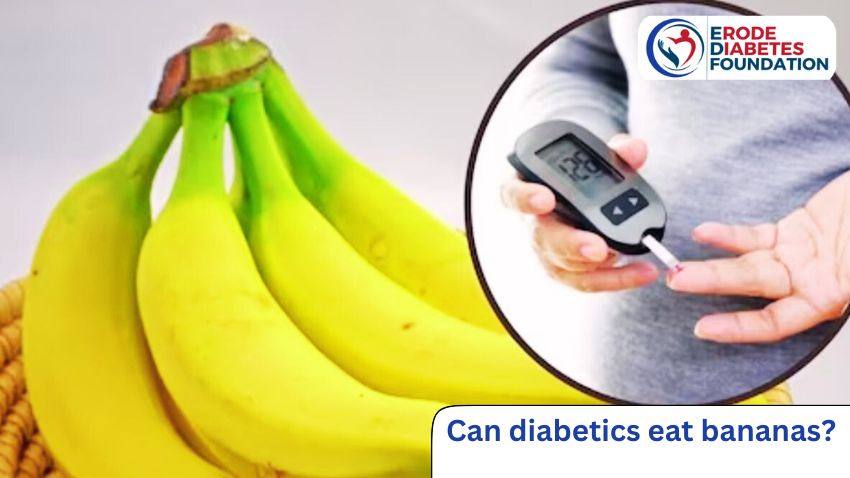A fruit that is commonly eaten by most people is the banana. But when it comes to diabetes, the most common question many have is, “Can diabetics eat bananas?” In this post, we’ll discuss bananas the one fruit that grows throughout the year and whether or not they’re a good choice for diabetics.

Can diabetics eat bananas?
Foods high in simple carbohydrates are known to cause blood sugar levels to rise quickly. A medium-sized banana has 6 grams of starch and 14 grams of sugar. However, bananas are also a great source of fiber and also included in the Indian diabetic food list. Eventhough bananas has low GI, bananas are a fruit that diabetics should choose with caution. Moreover, you can eat bananas with the following tips
- To cut down on the amount of sugar you eat in one sitting, watch out for the consumption of portion sizes of bananas. (Consume a smaller or medium sized banana than a larger one)
- Minimizing the sugar in the banana, choose one that isn’t too ripe.
- To assist lower the glycemic load and maintain stable blood sugar levels, spread out your fruit intake.
- Helps in reducing the speed at which the sugar is absorbed, eat your bananas with other foods like almonds, full-fat yoghurt, kefir, sauerkraut, or other fermented foods. Moreover, this combination can contribute to a more balanced and supportive gut microbiota.
Nutritional value of bananas
While bananas contain natural sugars, they also offer essential nutrients such as potassium, vitamin C, and fiber. Certainly! here’s a general overview of the nutritional values of a medium-sized banana (approximately 118 grams):
- Calories: Around 80-105 kcal depends on the size.
- Carbohydrates: Approximately 27 grams
- Sugars: About 14 grams
- Dietary Fiber: Roughly 3 grams
- Protein: Approximately 1.3 grams
- Fat: Around 0.3 grams
Vitamins and Minerals:
- Vitamin C: About 10% of the Daily Value (DV)
- Vitamin B6: Approximately 20% of the DV
- Potassium: Around 400 mg (around 10% of the DV)
- Manganese: Roughly 15% of the DV
- Magnesium: About 8% of the DV
These values can vary slightly depending on the specific type of banana. Keep in mind that these numbers provide a general idea, and the nutritional content may vary based on factors such as ripeness and growing conditions.
Banana and gut health for diabetics
Bananas do not contain probiotics, which are live beneficial bacteria supporting gut health. However, bananas do contain dietary fiber, including prebiotics, which can be beneficial for the growth and activity of probiotics in the gut. Prebiotics are non-digestible fibers that promote the growth and activity of beneficial bacteria in the digestive system.
The primary prebiotic in bananas is inulin. Inulin is a soluble fiber that resists digestion in the small intestine and reaches the colon, where it serves as a substrate for the growth and activity of probiotics.
The prebiotic effect of inulin promotes the proliferation of beneficial bacteria, such as Bifidobacterium. These bacteria play a role in maintaining a healthy gut microbiota, contributing to improved digestion and overall gut health.
To conclude
Consequently, your query, “Can diabetics eat bananas?” has been answered by this blog post. Finally, diabetics can benefit from consuming various types of bananas but in moderation and portion control is the key. Remember to consult your doctor before including bananas in your diabetic diet.


